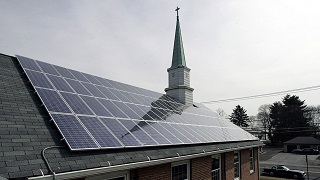From Guest Blogger Meghan Belnap: Five Ways Solar Energy Can Improve Your Business Productivity

The technology for solar-based power systems has come a long way in the past 20 years and has become far more efficient than it once was, and solar power has become much less expensive too! Here are a few ways solar power can help your business.
Cheaper Energy Bills
Solar power has become cheaper than conventional electricity from a cost-per-watt perspective, dropping from over $75 per watt in 1977 to just 30 cents per watt in 2015. According to Degree C Pty Ltd, installing a solar hot water system can save you up to 80% on annual hot water costs.
So why has such a dramatic reduction in power costs come to pass? The answer is very simple. One of the key ingredients in making solar panels, an ultra-pure form of polysilicon, has dropped in price tremendously over the past 20 years, despite a shortage between 2005 and 2008 that caused prices to rise slightly. Today, countries such as China and India have ended up with an overabundance of polysilicon, which lowers the manufacturing costs of solar panels. These savings are then being passed on to the consumer in the form of lower panel purchase prices and lower installation costs, making solar power increasingly feasible.
Solar Power is a Smart Investment for Companies
Though the price you will pay for installation will likely be around $15,000 to $30,000 and sometimes beyond, depending on the company you choose to buy from, your system will pay for itself in a short time, and after that any power you generate will basically be free or extremely low-cost. In fact, a group of researchers from Oxford University predicts that solar panel costs will continue to fall by an astounding 10% each year if prices continue falling at their current rate. When you look at this information, making the switch to solar power makes quite a bit of sense from a financial standpoint.
Tax Breaks for Switching to Solar Power
The US government has a program that offers incentives to small businesses that install solar panels and other energy saving measures. These incentives include tax breaks, rebates, and renewable energy certificates. The government incentives for which you are eligible will further reduce costs associated with installation of your new solar energy system.
Clean for the Environment
Solar generators do not rely on fossil fuels or greenhouse gases such as carbon dioxide the way conventional electric generators do. All that is needed is energy from the sun. You can really make a statement in marketing when you state that your company runs completely off solar energy. It lets customers know that you are doing your part to cut down on greenhouse gas emissions and save our planet from global warming.
Low Maintenance
Solar generators require very little in the way of maintenance because they use no moving parts. Very often, a quick dusting and/or hosing off to remove dirt, dust, leaves and other debris is all that is needed. This allows you and your employees to concentrate on increasing your profit margin.
Solar energy has its vast advantages that have proven more cost-effective than ever before. Consider making the switch to solar power by implementing small changes little by little. You’ll be glad you did when your next energy bill arrives!

From the post:
“Though the price you will pay for installation will likely be around $15,000 to $30,000 and sometimes beyond, depending on the company you choose to buy from, your system will pay for itself in a short time,…”
Well run companies want to know what the return on the investment is, i.e., the internal rate of return. That enables them to compare the returns on several investments so that they can make the best decision. Perhaps the return on investment is sometimes provided for solar systems, but I have never seen it.